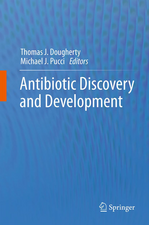Animal Models of Diabetes: Methods and Protocols: Methods in Molecular Biology, cartea 2128
Editat de Aileen J. F. Kingen Limba Engleză Paperback – 17 mar 2020
This volume discusses a variety of animal models of diabetes, as well as describes techniques used to study end-points when using these models. The chapters in this book cover topics such as important considerations when working with mouse models of diabetes, highlighting factors that new investigators may not be aware of and some potential pitfalls in experimental outcomes; main characteristics of some commonly used animal models of diabetes research, ranging from mice to primates; animal models used to study specific aspects of beta-cell biology; and a focus on techniques used to assess blood glucose homeostasis, insulin action, and islet function in vivo and ex vivo. Written in the highly successful Methods in Molecular Biology series format, chapters include introductions to their respective topics, lists of the necessary materials and reagents, step-by-step, readily reproducible laboratory protocols, and tips on troubleshooting and avoiding known pitfalls.
Cutting-edge and comprehensive, Animal Models of Diabetes: Methods and Protocols is a valuable resource that will help diabetes researchers design and carry out in vivo studies that will best suit their experimental questions and needs.
| Toate formatele și edițiile | Preț | Express |
|---|---|---|
| Paperback (1) | 785.67 lei 38-44 zile | |
| Springer Us – 17 mar 2020 | 785.67 lei 38-44 zile | |
| Hardback (1) | 982.20 lei 38-44 zile | |
| Springer Us – 17 mar 2020 | 982.20 lei 38-44 zile |
Din seria Methods in Molecular Biology
- 9%
 Preț: 791.63 lei
Preț: 791.63 lei - 23%
 Preț: 598.58 lei
Preț: 598.58 lei - 20%
 Preț: 882.98 lei
Preț: 882.98 lei -
 Preț: 252.05 lei
Preț: 252.05 lei - 5%
 Preț: 802.70 lei
Preț: 802.70 lei - 5%
 Preț: 729.61 lei
Preț: 729.61 lei - 5%
 Preț: 731.43 lei
Preț: 731.43 lei - 5%
 Preț: 741.30 lei
Preț: 741.30 lei - 5%
 Preț: 747.16 lei
Preț: 747.16 lei - 15%
 Preț: 663.45 lei
Preț: 663.45 lei - 18%
 Preț: 1025.34 lei
Preț: 1025.34 lei - 5%
 Preț: 734.57 lei
Preț: 734.57 lei - 18%
 Preț: 914.20 lei
Preț: 914.20 lei - 15%
 Preț: 664.61 lei
Preț: 664.61 lei - 15%
 Preț: 654.12 lei
Preț: 654.12 lei - 18%
 Preț: 1414.74 lei
Preț: 1414.74 lei - 5%
 Preț: 742.60 lei
Preț: 742.60 lei - 20%
 Preț: 821.65 lei
Preț: 821.65 lei - 18%
 Preț: 972.30 lei
Preț: 972.30 lei - 15%
 Preț: 660.49 lei
Preț: 660.49 lei - 5%
 Preț: 738.41 lei
Preț: 738.41 lei - 18%
 Preț: 984.92 lei
Preț: 984.92 lei - 5%
 Preț: 733.29 lei
Preț: 733.29 lei -
 Preț: 392.60 lei
Preț: 392.60 lei - 5%
 Preț: 746.26 lei
Preț: 746.26 lei - 18%
 Preț: 962.66 lei
Preț: 962.66 lei - 23%
 Preț: 860.22 lei
Preț: 860.22 lei - 15%
 Preț: 652.64 lei
Preț: 652.64 lei - 5%
 Preț: 1055.50 lei
Preț: 1055.50 lei - 23%
 Preț: 883.87 lei
Preț: 883.87 lei - 5%
 Preț: 1141.13 lei
Preț: 1141.13 lei - 19%
 Preț: 491.89 lei
Preț: 491.89 lei - 5%
 Preț: 1038.86 lei
Preț: 1038.86 lei - 5%
 Preț: 524.16 lei
Preț: 524.16 lei - 18%
 Preț: 2122.34 lei
Preț: 2122.34 lei - 5%
 Preț: 1299.23 lei
Preț: 1299.23 lei - 5%
 Preț: 1339.12 lei
Preț: 1339.12 lei - 18%
 Preț: 1390.26 lei
Preț: 1390.26 lei - 18%
 Preț: 1395.63 lei
Preț: 1395.63 lei - 18%
 Preț: 1129.65 lei
Preț: 1129.65 lei - 18%
 Preț: 1408.26 lei
Preț: 1408.26 lei - 18%
 Preț: 1124.92 lei
Preț: 1124.92 lei - 18%
 Preț: 966.27 lei
Preț: 966.27 lei - 5%
 Preț: 1299.99 lei
Preț: 1299.99 lei - 5%
 Preț: 1108.51 lei
Preț: 1108.51 lei - 5%
 Preț: 983.76 lei
Preț: 983.76 lei - 5%
 Preț: 728.16 lei
Preț: 728.16 lei - 18%
 Preț: 1118.62 lei
Preț: 1118.62 lei - 18%
 Preț: 955.25 lei
Preț: 955.25 lei - 5%
 Preț: 1035.62 lei
Preț: 1035.62 lei
Preț: 785.67 lei
Preț vechi: 827.02 lei
-5% Nou
Puncte Express: 1179
Preț estimativ în valută:
150.36€ • 163.26$ • 126.30£
150.36€ • 163.26$ • 126.30£
Carte tipărită la comandă
Livrare economică 18-24 aprilie
Preluare comenzi: 021 569.72.76
Specificații
ISBN-13: 9781071603871
ISBN-10: 1071603876
Pagini: 342
Ilustrații: XI, 342 p. 49 illus., 39 illus. in color.
Dimensiuni: 178 x 254 mm
Ediția:1st ed. 2020
Editura: Springer Us
Colecția Humana
Seria Methods in Molecular Biology
Locul publicării:New York, NY, United States
ISBN-10: 1071603876
Pagini: 342
Ilustrații: XI, 342 p. 49 illus., 39 illus. in color.
Dimensiuni: 178 x 254 mm
Ediția:1st ed. 2020
Editura: Springer Us
Colecția Humana
Seria Methods in Molecular Biology
Locul publicării:New York, NY, United States
Cuprins
Practical Considerations when Using Mouse Models of Diabetes.- An Overview of Rodent Models of Obesity and Type 2 Diabetes.- Selectively Bred Diabetes Models: GK Rats, NSY Mice, and ON Mice.- A Review of Mouse Models of Monogenic Diabetes and ER Stress Signalling.- Rat Models of Human Type 1 Diabetes.- Mouse Models of Autoimmune Diabetes: The Non-Obese Diabetic (NOD) Mouse.- Mouse Models of Virus-Induced Type 1 Diabetes.- Rat Models of Virus-Induced Type 1 Diabetes.- Large Animal Models of Diabetes.- Use of Streptozotocin in Rodent Models of Islet Transplantation.- Transplantation of Islets of Langerhans into the Anterior Chamber of the Eye for Longitudinal In Vivo Imaging.- Multicolor Labeling and Tracing of Pancreatic Beta-Cell Proliferation in Zebrafish.- Generating Beta-Cell Specific Transgenic Mice Using the Cre-Lox System.- The Glucose Tolerance Test in Mice.- Assessment of Insulin Tolerance In Vivo in Mice.- Continuous Glucose Monitoring in Conscious Unrestrained Mice.- Assessing Mouse Islet Function.- Assessing Immune Responses in the Nonobese Diabetic Mouse Model of Type 1 Diabetes.- Assessment of Insulin Tolerance Ex Vivo.- Using Pancreas Tissue Slices for the Study of Islet Physiology.- Determining Beta Cell Mass, Apoptosis, Proliferation, and Individual Beta Cell Size in Pancreatic Sections.
Textul de pe ultima copertă
This volume discusses a variety of animal models of diabetes, as well as describes techniques used to study end-points when using these models. The chapters in this book cover topics such as important considerations when working with mouse models of diabetes, highlighting factors that new investigators may not be aware of and some potential pitfalls in experimental outcomes; main characteristics of some commonly used animal models of diabetes research, ranging from mice to primates; animal models used to study specific aspects of beta-cell biology; and a focus on techniques used to assess blood glucose homeostasis, insulin action, and islet function in vivo and ex vivo. Written in the highly successful Methods in Molecular Biology series format, chapters include introductions to their respective topics, lists of the necessary materials and reagents, step-by-step, readily reproducible laboratory protocols, and tips on troubleshooting and avoiding known pitfalls.
Cutting-edge and comprehensive, Animal Models of Diabetes: Methods and Protocols is a valuable resource that will help diabetes researchers design and carry out in vivo studies that will best suit their experimental questions and needs.
Caracteristici
Includes cutting-edge methods and protocols Provides step-by-step detail essential for reproducible results Contains key notes and implementation advice from the experts


























